Understanding the costs involved in various aspects of your wedding is crucial for setting realistic expectations.
By aligning your dream wedding with your financial reality, you ensure that your plans are achievable without overextending yourself financially.
A clear grasp of typical wedding expenses helps you avoid common pitfalls, such as overlooking hidden costs or last-minute additions, which can blow your budget.
This approach not only keeps your spending in check but also positions you to start your married life on a strong financial footing.
The exact cost of everything can fluctuate widely based on choices like DIY vs. professional services, personal preferences, and regional cost differences.
It’s important for you to get detailed quotes and understand what is included in each service to avoid unexpected expenses.
Reception

The reception typically encompasses a significant portion of the wedding budget due to the variety of elements involved.
- Venue: Costs can vary significantly depending on the location and prestige of the venue. This fee usually includes use of the space for a set number of hours and often requires a security deposit to cover potential damages. Additional charges may apply for extra hours, special lighting, or audio-visual equipment.
- Catering and Beverages: Options range from plated meals and buffets to family-style servings. Costs vary widely based on the menu complexity and the caterer’s prestige. Drink options can include non-alcoholic beverages to full open bars, with costs depending on the selection and duration of service.
- Cake: The wedding cake, often priced by the slice, may also involve a fee for cake cutting and service.
- Decorations: Includes floral arrangements, table centrepieces, decorative accents, and lighting such as uplighting, fairy lights, or specialised dance floor lighting. Thematic decor may include items like table linens, chair covers, and decorative hire items like archways or backdrops.
- Staffing: May include waitstaff, bartenders, and possibly a coordinator or event manager from the catering company. Some venues require professional security services, especially if the event is large or features an open bar.
- Miscellaneous:
- Transportation: For the bridal party and possibly guests, from the ceremony to the reception venue.
- Parking: May require valet parking or reserved parking spaces.
- Gratuities: Often not included in initial quotes but customary at 15-20% of the service fee.
- Insurance: Some venues require event insurance to cover damages and liability.
Ceremony

- Rental Fee: Costs vary depending on the type of venue, such as a church, temple, hotel, outdoor park, or specialised event space. Fees can range from a nominal amount at a community centre to several thousand dollars at high-demand locations.
- Clergyman/Celebrant/Officiant Fee: Costs can vary widely based on whether the officiant is part of a religious institution or is an independent celebrant. Some may request a donation, while others have set fees ranging from $50 to several hundred dollars.
- Decoration and Setup Fees: Includes costs for aisle runners, flowers, arches, and other decor specifically for the ceremony. These elements set the tone and personalise the space.
- Other Decorative Elements: Items such as candles, lanterns, or fabric drapes can add a romantic and personalised touch to the venue.
- Musicians: Hiring live musicians, such as a string quartet, harpist, or soloist, to perform during the ceremony. Live music adds a memorable and elegant atmosphere.
- Sound System Rental: Necessary if the venue doesn’t provide a sound system and the wedding is large or outdoors, ensuring all guests can hear the ceremony clearly.
- Chairs and Other Rentals: Required if the venue does not provide these, or if additional seating is needed for guests. Consider the comfort and view of the attendees.
- Celebratory Send-Off: Items like congratulatory rice, birdseed, bubbles, or other items for a celebratory send-off as the couple exits the ceremony. Be aware that some venues may have restrictions on certain materials like rice or confetti due to environmental concerns or cleanup requirements.
Wedding Planner

Hiring a wedding planner and considering other related services are significant aspects of wedding planning that can greatly influence the overall experience and smooth execution of the event.
- Full-Service Planning: A full-service wedding planner manages every aspect of the wedding from the early planning stages through the actual day. This includes vendor coordination, venue selection, timeline management, budgeting, and day-of execution. Costs can range significantly depending on the planner’s experience and regional factors, typically ranging from 10% to 20% of the total wedding budget or a flat fee that can start from a few thousand dollars.
- Partial Planning: For couples who want to handle some aspects themselves but need help with specific tasks, partial planners are available. This service can vary greatly in price, depending on the tasks involved.
- Day-of Coordinator: A day-of coordinator takes over the event management on the wedding day to ensure everything runs smoothly, allowing the couple and their families to relax and enjoy the day. This service typically costs less than full-service planning, with fees often ranging from $800 to $2,500.
Attire and Accessories

The attire for your wedding day, including accessories, represents a significant part of the overall aesthetic and can be one of the more personal and variable costs in your wedding budget.
- Wedding Dress: Prices can vary widely, typically from a few hundred to several thousand dollars, influenced by the designer, materials, and details. Alterations may also add substantially to the cost.
- Groom’s Suit/Tuxedo: Purchasing a suit or tuxedo can cost between $300 and $1,000 or more. Rentals are generally cheaper, ranging from $100 to $300.
- Bridesmaids’ Dresses: Costs range from $100 to over $300 per dress. Often, bridesmaids are asked to purchase their own dresses.
- Groomsmen’s Attire: Similar to the groom, renting is a popular and cost-effective option, with prices comparable to those of the groom’s rentals.
- Shoes: Bridal shoes typically cost between $50 and $300. Groom’s and groomsmen’s dress shoes also fall within this range.
- Headpieces and Veils: These can cost anywhere from $50 to over $300, depending on complexity and design.
- Jewellery: Costs vary from affordable costume pieces starting around $20 to more expensive fine jewellery.
- Accessories: This includes ties, cufflinks, belts, and pocket squares for the groom and groomsmen, potentially costing between $30 and $200.
- Undergarments and Special Bras: Essential for the proper fit of the wedding attire, prices range from $50 to $150.
- Alterations: Necessary for ensuring a perfect fit, alterations can range from $50 to several hundred dollars, depending on the complexity.
Beauty and Grooming

Beauty and grooming services play a crucial role in preparing for a wedding, enhancing confidence and ensuring everyone looks picture-perfect.
These services not only contribute to the aesthetics of the wedding but also help make the day more enjoyable and less stressful for the bride, groom, and their party.
Booking these services well in advance is advisable, especially if the wedding coincides with a busy season.
- Hair Styling: Hair services for the bride can range from $150 to $400, depending on the complexity of the style and the reputation of the stylist. Groom’s hairstyling might be simpler and less expensive, generally between $30 and $100.
- Makeup: Professional makeup for the bride typically costs between $100 and $300. This often includes a trial session before the wedding day to finalise the look.
- Manicures and Pedicures: These services are often chosen by the bride and possibly the bridal party. Costs can range from $20 to $100 per person, depending on the salon and the types of services chosen.
- Facial Treatments and Skincare: Some brides and grooms opt for professional skincare treatments leading up to the wedding, which can cost from $50 to $200 per session.
- Spa Treatments: Couples might choose to indulge in pre-wedding spa treatments, such as massages or body wraps, which can help reduce stress. Prices vary widely but typically range from $50 to $200 per treatment.
- Grooming Kits for Men: These might include special shaving or grooming products and services, often priced between $50 and $150.
Photography and Videography

Choosing the right professionals to capture your wedding day ensures that you not only preserve memories but also have beautifully crafted photos and videos to look back on for years to come.
- Photographer: Costs can vary widely based on experience, style, and location. Generally, wedding photography packages range from $1,000 to over $4,000. These packages often include several hours of coverage, digital photos, and sometimes an engagement shoot.
- Videographer: Similar to photography, videography costs depend on the professional’s experience and the package details. Prices typically range from $1,000 to over $3,000. Packages might include full-day coverage, a highlight reel, and a full-length video.
- Additional Sessions: Engagement and bridal portrait sessions are often offered as part of packages or as add-ons. These can cost anywhere from $300 to $800.
- Travel Expenses: If the photographer or videographer is not local, you may need to pay for their travel and accommodations.
- Extra Hours: If your wedding day extends beyond the contracted time, additional hours will increase costs. Typically, photographers and videographers charge $200 to $500 per extra hour.
- Proofs: Some photographers provide physical or digital proofs for you to review before finalising the album. Additional charges for proofs may apply, depending on the photographer’s policy. Typically, the cost of proofs can range from $100 to $400, and they are sometimes included in the package price.
- Albums and Prints: Many couples choose to have albums or prints made through their photographer. The costs for these can range from $200 to $1,000, depending on the quality and complexity of the album.
- Drone Footage: For dramatic aerial shots, some videographers offer drone footage as part of their packages or for an additional fee, which can range from $300 to $1,000.
Music and Entertainment
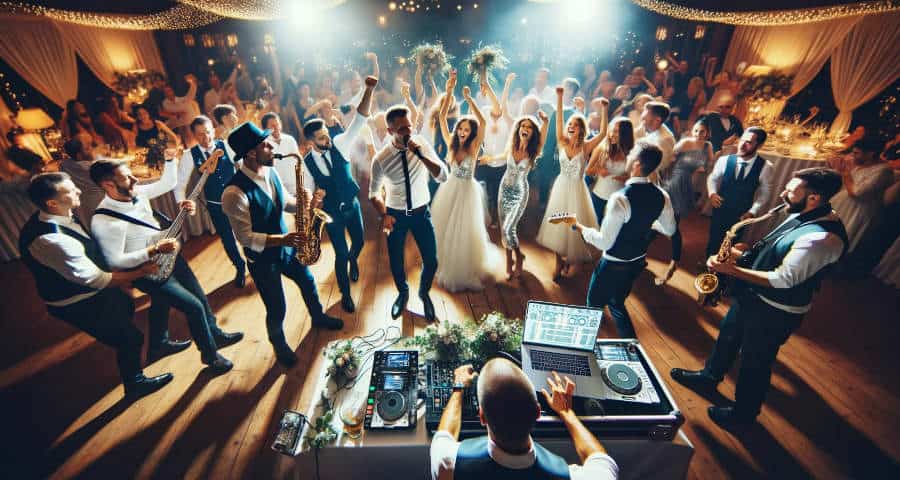
Budgeting for music and entertainment should reflect the importance of ambiance and guest enjoyment at your wedding. These costs can vary widely, so getting quotes and considering what will best fit your vision and venue is advisable.
- DJ: Hiring a DJ is a popular choice for many weddings due to their ability to mix a wide range of music styles and manage the flow of the evening. Prices for DJ services can vary, generally ranging from $500 to $2,500, depending on experience and demand.
- Live Bands: For a live music experience, bands can range from small jazz or classical ensembles to full rock or pop bands. Costs can vary significantly based on the band’s reputation and the number of musicians. Generally, you might expect to pay between $1,500 and $10,000.
- Sound System Rental: If your venue does not provide a sound system, or if you need additional equipment like microphones and speakers, rentals can cost anywhere from $300 to $1,500.
- Lighting: To enhance the atmosphere, especially for evening receptions, professional lighting can be crucial. Lighting setups can cost between $500 and $2,000.
- Specialty Entertainment: This category includes unique forms of entertainment such as photo booths, which typically cost between $400 and $1,000, magicians, dancers, or even fire performers, with prices varying widely based on the act.
- Dance Floors: If the venue does not include a dance floor, renting one may be necessary. Costs for dance floor rentals can range from $200 to $1,500 depending on the size and type of floor.
Flowers and Decorations
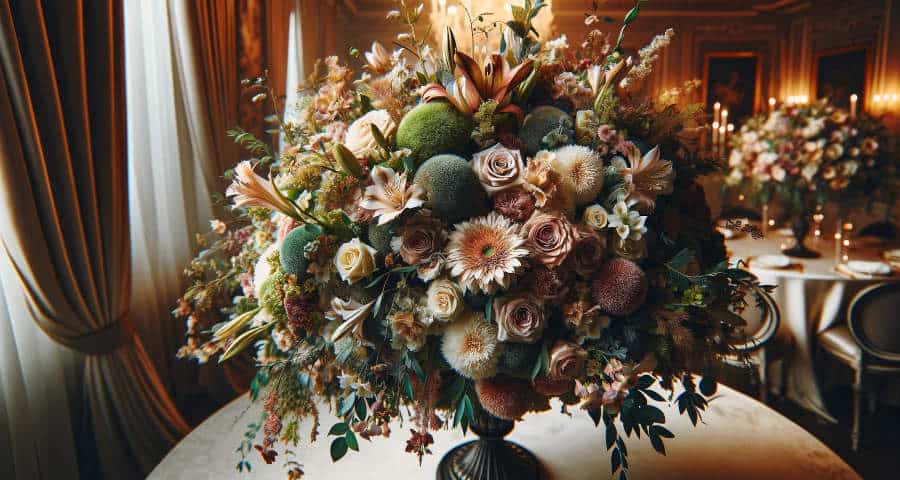
Budgeting for flowers and decorations involves a careful balance of aesthetic desires and financial realities. It’s advisable to discuss your vision and budget with your florist and decorators early in the planning process to ensure alignment and avoid any unexpected expenses.
- Floral Arrangements: Depending on the types of flowers chosen, the season, and the complexity of arrangements, costs can range significantly. Basic arrangements typically start around $500, while more elaborate floral designs can exceed $5,000.
- Centrepieces: Each table centrepiece can vary in cost from $50 to $300 or more, depending on size and the types of flowers used.
- Bridal Bouquet: The bridal bouquet tends to be more elaborate than other bouquets and can cost between $100 and $300.
- Bridesmaids’ Bouquets: These are usually smaller and less elaborate than the bridal bouquet, costing between $50 and $150 each.
- Boutonnieres and Corsages: Boutonnieres for the groomsmen and corsages for family members typically range from $10 to $30 each.
- Ceremony Decor: Costs for decorating the ceremony venue can include items like aisle runners, chair decorations, altar flowers, and entryway pieces. This can range from $400 to several thousand dollars, depending on the extent of the decoration.
- Reception Decor: Includes not just floral arrangements but also lighting, fabric draping, and thematic elements. Depending on the choices, costs can range from a few hundred dollars for minimal decoration to several thousand for more luxurious settings.
- Rental Items: Items such as vases, candles, arches, and other decorative elements may need to be rented. Rental costs can vary widely but generally start around $200 and can go up to $2,000 or more, depending on the items and quantity needed.
- Set Up and Tear Down Fees: Some florists and rental companies charge additional fees for setup and teardown, which can add several hundred dollars to the total cost.
Stationery and Invitations
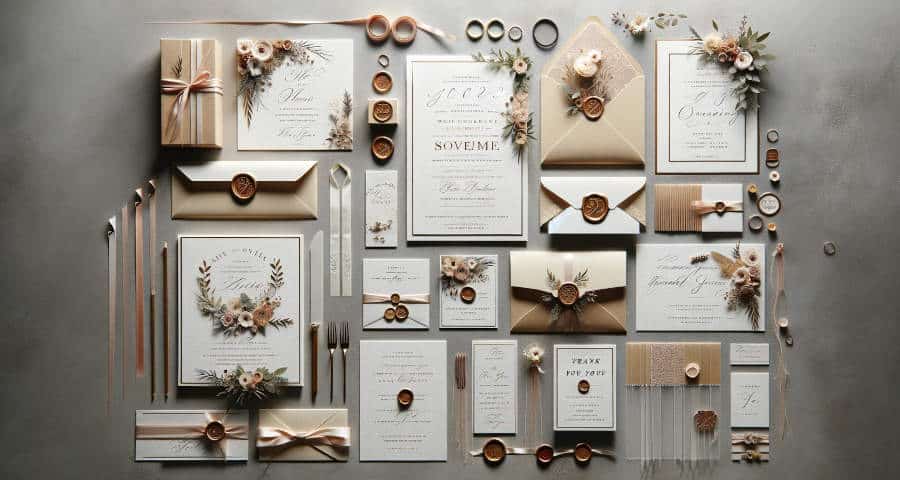
The stationery for your wedding not only serves a functional purpose but also offers a first glimpse into the style and theme of your wedding.
- Save-the-Dates: These preliminary notices usually go out several months before the wedding, especially if many guests are travelling from out of town. Costs can range from $0.50 to $3.00 per card, depending on design and printing methods.
- Wedding Invitations: The main invitation package typically includes the invitation itself, a response card, and often additional information such as directions or accommodations. Prices vary widely based on the choice of paper, printing techniques (like letterpress, engraving, or digital), and custom designs, generally ranging from $2 to $10 per set.
- Programs: These provide guests with information about the ceremony sequence and participants. Depending on the complexity and design, costs can range from $1 to $3 per program.
- Menus: If you’re having a sit-down dinner with multiple choices, menus are usually placed at each setting. These can cost from $1 to $3 each, depending on the paper and print quality.
- Place Cards: Essential for assigned seating arrangements, place cards can range from $0.50 to $2.00 each.
- Thank You Cards: These are sent out after the wedding to thank guests for their gifts and attendance. Like invitations, costs vary but typically range from $1 to $3 per card.
- Postage: Don’t forget to account for the cost of postage for save-the-dates, invitations, and thank-you cards. Since wedding invitations often include multiple pieces and can be heavier than standard mail, higher postage rates may apply. Expect to spend $0.55 to $2.00 or more per envelope, depending on weight and size.
Wedding Rings

While some couples may view the purchase of wedding rings as a separate expense from the wedding itself, I have included them in this list to give you a more accurate picture of your total wedding expenses.
- Bride’s Ring: Simple bands made from materials like gold, silver, or platinum can range from $100 to $1,000. More elaborate designs, especially those including diamonds or other gemstones, can range from $1,000 to over $5,000.
- Groom’s Ring: Typically simpler than the bride’s ring, groom’s bands range from $100 to $1,000, depending on the material and design. Options include traditional metals like gold, silver, and platinum, as well as titanium and tungsten. The latter are popular choices for their durability and cost-effectiveness, appealing to those looking for modern, low-maintenance options.
- Insurance: It’s advisable to consider insuring your wedding rings, especially if they are valuable. Annual premiums generally cost 1% to 2% of the ring’s value, depending on the insurance policy and coverage.
Transportation

Efficient transportation planning is crucial for ensuring a smooth flow on your wedding day. Here’s how to consider and budget for the various transportation needs:
- Bride: Costs typically include the rental and service fees for transporting the bride and possibly her bridal party to the ceremony venue.
- Groom: Similar to the bride’s, this covers the cost for the groom and possibly his groomsmen to arrive at the ceremony.
- To the Reception: The transportation used to reach the ceremony can often be reused for moving to the reception. Alternatively, new arrangements may be required, depending on the logistics.
- After the Reception: Consider whether the same service will wait to take the newlyweds and possibly guests home, or if unique or more convenient transportation will be arranged for the end of the festivities.
- Guest Transportation: Includes the cost of shuttles or buses if you are providing transport for guests, especially useful if the ceremony and reception are far apart or if many guests are out-of-towners.
- Parking: If the venues do not offer free parking, you may need to cover parking fees for guests or rent additional parking space.
- Additional Fees: Consider potential extra costs such as driver overtime, late night charges, and gratuities for drivers.
Accommodation

The guests might be paying for themselves, so this might not be an expense you have to cover, or it might be something you’re willing to do to help people who are travelling far for your wedding.
When planning accommodations, consider the convenience, comfort, and cost to ensure all guests have a pleasant experience. It’s also wise to book accommodations early, especially if the wedding is during a peak season or in a popular location, to secure the best rates and availability.
- Hotel Blocks: Many couples reserve blocks of rooms at a local hotel, which usually offers a discounted rate. Costs can vary widely depending on the location and type of hotel, but expect discounts ranging from 10% to 25% off standard rates for blocks of 10 rooms or more.
- Guest Houses or Vacation Rentals: Renting larger properties like guest houses or vacation homes can be cost-effective for accommodating larger groups or families. Prices will vary based on location, size, and luxury level but can often provide more space and amenities compared to standard hotel rooms.
- Bride and Groom Suite: It’s traditional for the couple to stay in a more luxurious or special room on their wedding night. Depending on the venue, this might be a suite in the same hotel where guests are staying or a separate accommodation. Costs can range from $150 to over $500 per night for more upscale options.
- Additional Fees: Don’t forget to account for any additional fees that might be incurred, such as parking at the hotel, WiFi charges, or resort fees, if applicable. These can add up and should be considered in the overall accommodation budget.
Gifts and Favours

By thoughtfully selecting gifts and favours, you not only thank those involved but also provide a lasting memory of your special day. Ensure these items reflect your appreciation and personal style while adhering to your budget constraints.
When budgeting for gifts and favours, consider how these costs add up, especially if you have a large wedding. It’s important to balance generosity with your overall wedding budget to avoid overspending.
- Wedding Favours: These are small gifts given to each guest as a token of appreciation and to commemorate the event. Costs can vary widely depending on the type of favour. Common favours include small keepsakes, edible items, or personalised objects. Expect to spend anywhere from $1 to $5 per guest, depending on the chosen item’s complexity and quality.
- Bridal Party Gifts: It’s customary to give a more substantial gift to members of the bridal party, including bridesmaids and groomsmen, as a thank you for their time and effort in supporting the wedding. Common gifts include jewellery for bridesmaids and cufflinks or flasks for groomsmen. Costs typically range from $25 to $100 per person.
- Gifts for Parents: Many couples choose to give a special gift to their parents as a thank you as a way to express gratitude (for their support, financially or otherwise)[/who-pays-for-the-wedding.html], in making the wedding happen. These gifts can be more sentimental, such as personalised items or a framed wedding photo. Prices can vary but generally range from $50 to $150 per set of parents.
- Welcome Gifts: For destination weddings or weddings with many out-of-town guests, welcome gifts are a thoughtful gesture. These might include items like local treats, maps, and small gifts that reflect the wedding location. These can range from $10 to $50 per gift, depending on how elaborate they are.
- Vendor Tips: While not obligatory everywhere, tipping wedding vendors as a thank you for their service is customary in many places, particularly in the United States. Tipping practices can vary widely based on location and cultural norms. Be sure to research the customs in your area to determine whether tipping is expected and, if so, what amounts are typical for each vendor.
Rehearsal Dinner
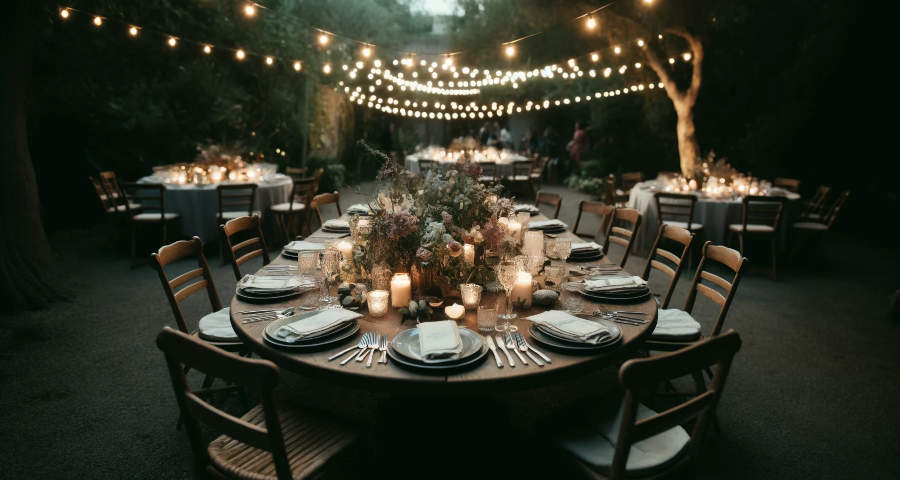
The rehearsal dinner not only serves as a prelude to your wedding but also provides a more intimate setting for both families to mingle. The rehearsal dinner is typically hosted and paid for by the groom’s family, according to traditional wedding etiquette, but modern practices vary widely depending on family preferences and financial situations.
- Venue Rental: Depending on the size of your guest list and the style of dinner you want, venue costs can vary. Options range from a private dining room in a restaurant to a more casual setting like a backyard BBQ. Costs can range from $300 to $2,000, depending on the location and exclusivity.
- Catering: This cost varies based on the type of food served and whether you opt for a sit-down meal or a buffet. Restaurant meals might range from $20 to $100 per person, while catering at a different venue might include additional service charges.
- Beverages: Alcohol can significantly affect your budget. Options include a cash bar (where guests pay for their own drinks), a limited bar (offering only wine and beer), or an open bar. Costs will depend on the duration of the event and the selections offered, generally ranging from $15 to $50 per person.
- Decorations: While typically less elaborate than the wedding day decor, you might still want to personalise the space with flowers, centrepieces, and other decorations. Budget around $100 to $500 for decor, depending on your tastes and the venue’s requirements.
- Invitations: If you choose to send formal invitations for the rehearsal dinner, costs can range from $1 to $3 per invitation, not including postage.
- Entertainment: While not as common, some might choose to have background music or a small live band during dinner. This could cost from $300 to $1,500, depending on the performer.
- Additional Expenses: These might include audio-visual equipment for speeches or a slideshow, which could add $100 to $300 to your budget.
Licences and Fees

Ensuring that you have all the necessary licences and have paid all required fees is crucial for your wedding day to proceed without any legal hitches. It’s wise to research these aspects well in advance to budget appropriately and fulfil all legal requirements timely.
- Marriage Licence: The cost of a marriage licence varies widely depending on the state or country. In the United States, fees can range from $20 to over $100. Some locales may require a waiting period or blood tests, which could add to the cost.
- Venue Licensing Fees: Some venues, especially those that are public or historically protected, may require a special licence or permit to hold a ceremony or reception. Costs can vary from $100 to several thousand dollars depending on the venue’s popularity, location, and the inclusivity of the package.
- Music Licensing Fees: If you plan to play music during your ceremony or reception, you might need to pay for a music licence. This is especially true if you’re hosting a large event or using a professional DJ. Licensing fees can range from $30 to $500.
- Name Change Fees: If one or both partners plan to change their name, there may be fees associated with updating drivers’ licences, passports, and social security information. These costs can vary but typically range from $100 to $300.
- Additional Permits: Depending on the location of your wedding, you may need additional permits, especially for large gatherings, outdoor public spaces, or unusual venues. These can cost anywhere from $50 to several hundred dollars.
Emergency Fund
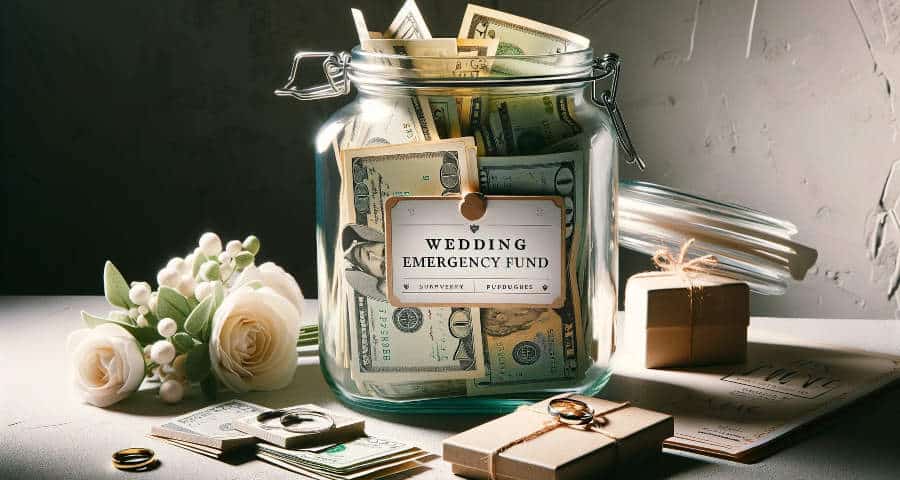
Establishing an emergency fund for your wedding provides peace of mind by ensuring you can handle unexpected costs without compromising other areas of your wedding or resorting to personal savings.
This proactive measure prepares you for anything from minor mishaps to significant adjustments, helping to make your wedding experience as stress-free as possible.
Suggested Amount: Financial planners generally recommend setting aside 5-10% of your total wedding budget for emergencies. For instance, if your overall wedding budget is $30,000, an emergency fund of $1,500 to $3,000 is advisable. This allocation helps cover any unforeseen expenses, ensuring that every aspect of your special day goes smoothly.
Honeymoon

After the excitement of the wedding, the honeymoon provides a much-needed retreat for couples to enjoy their first days of marriage. Planning and budgeting for a honeymoon can vary widely based on the destination, length of stay, and the activities planned. Here’s what you might expect in terms of expenses:
- Travel Costs: Includes airfare or other transportation costs to and from the honeymoon destination. Prices can range significantly depending on distance and travel style, with international flights obviously costing more than domestic ones. Expect to spend anywhere from $500 to $2,000 per person on travel.
- Accommodations: Depending on the level of luxury and location, nightly rates can vary widely. Budget hotels or Airbnb rentals might start at $50 to $150 per night, while luxury resorts or boutique hotels can cost from $200 to over $1,000 per night.
- Dining and Groceries: Meals can be a significant part of the honeymoon budget, especially if dining out at high-end restaurants or in expensive tourist areas. Daily food expenses could range from $50 to $200 per day, per couple, depending on dining choices.
- Activities and Excursions: Costs for entertainment, sightseeing, and special experiences like spa treatments, guided tours, or adventure sports. These expenses can vary greatly but typically range from $100 to $500 per day, depending on the activities chosen.
- Miscellaneous Expenses: Includes shopping, souvenirs, tips, and other incidental costs. It’s a good idea to set aside $200 to $500 for these unplanned expenses.
- Travel Insurance: Travel insurance is highly recommended, especially for more expensive trips. It can cover everything from medical emergencies to trip cancellations. Costs depend on the coverage amount and trip cost, but generally range from 4% to 8% of the total trip cost.
- Special Experiences: Some couples choose to splurge on a special experience during their honeymoon, like a hot air balloon ride, a private dinner on the beach, or a luxury cruise. These can range from $100 to over $1,000, depending on the extravagance of the experience.
Effective Budget Management
Now that you have a detailed understanding of the typical expenses involved in a wedding, it’s crucial to manage these costs effectively to ensure your budget aligns with your vision without causing financial strain.
To help you organise and track your wedding expenses accurately, we offer a comprehensive Wedding Budget Template. This template, available in both Excel and Google Docs formats, is designed to provide a structured and user-friendly approach to financial planning.

